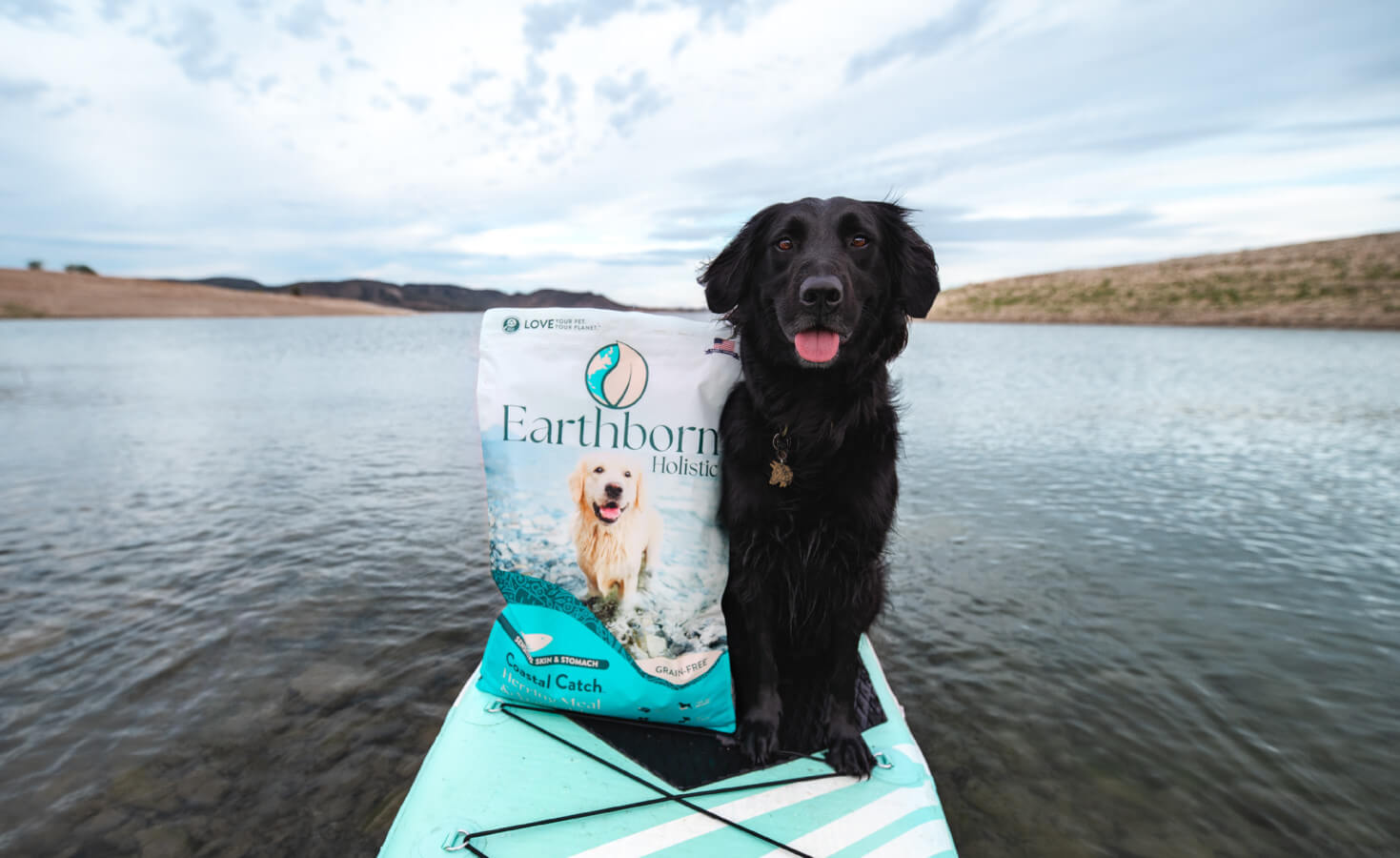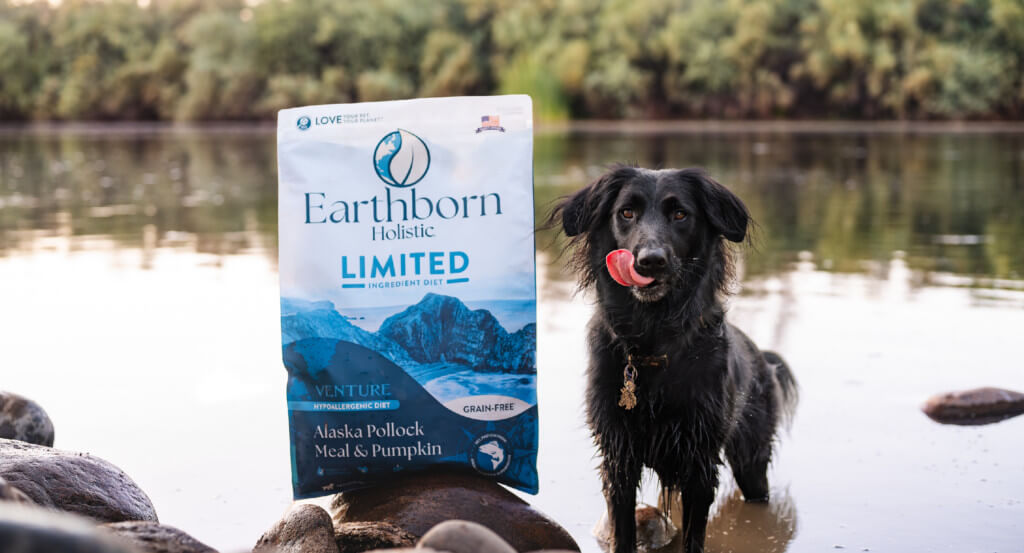Diets for Dogs with Allergies and Sensitivities
Trying to figure out if your dog has allergies and what to feed them in response can be a frustrating process. While the light at the end of the tunnel may be that your dog might not actually have an allergy at all, Earthborn Holistic has a recipe perfect for every paw–even itchy ones! Keep reading to learn more about dog food for skin allergies and sensitivities.

Do You Need the Best Food for Dogs with Food Allergies? Symptoms Described by an Expert
Once you learn the differences between a food intolerance vs allergy, learning how to treat allergies in dogs and finding food for allergies becomes a lot less daunting. To get the scoop on how to tell the difference between an allergy and an intolerance, we turned to Dr. Anne Huss, Earthborn Holistic’s Director of Nutrition Services:
A food allergy is a result of a flaw in a pet’s immune system and is an abnormal reaction to normal foods triggered by an animal’s immune system. In some cases, a pet’s immune system can misidentify or misjudge safe compounds (usually proteins) as a threat, which causes the body to attack, leading to a food allergy.
A food intolerance, on the other hand, can be either an unusual reaction to normal food or normal reactions to abnormal foods that do not trigger a response from the immune system. For example, if your dog happens to get into the trash and eats spoiled food, the resulting vomiting and/or diarrhea would be considered a normal reaction to an abnormal food not due to a response from the immune system.
Food allergies can take months to years to develop to a particular food. Once developed, the allergy will persist with a negative reaction to that particular food or allergen. On the other hand, a food intolerance will come on more quickly due to the immune system not mediating the response.
Unfortunately, it can be difficult to figure out if your dog has a full-blown food allergy or a food intolerance since the symptoms of each are similar.
Signs That It’s Time to Invest in the Best Diet for Dogs with Allergies
Dr. Anne tells us that symptoms for both allergies and intolerances can range from skin irritations, especially dry skin or itchiness on your dog’s paws or ears, to chronic infections to upset stomach issues in dogs. Because symptoms of food allergies and intolerances are so similar and can also be similar to other potential health issues, it’s always recommended to work with your dog’s vet to determine any allergies or intolerances and rule out other health problems. By working with your vet, you’ll be able to narrow down any allergies and find the best diet for dogs with allergies for your dog.
Skin Irritation
If you notice your dog has a coat or dry, flaky skin that’s showing signs of irritation, it could be a sign that their body doesn’t quite agree with an ingredient in their food. If you start to notice sores or wounds on your dog’s skin and you’re not sure where they came from, it’s worth scheduling an appointment with your vet to see if food for dogs with allergies could help clear up these issues. If your dog does have an allergy, switching to a limited ingredient dog food or even just a food that doesn’t contain the ingredient your dog is allergic to can make a big difference. That being said, skin irritation could be a sign of other conditions as well so make sure to talk to your vet first so you can make sure you have the correct cause of the irritation.
Dry Skin or Itchiness
Similar to skin irritation, dry and itchy skin can also be a sign your dog may be struggling with allergies. If you notice that your dog has dry patches, dry skin overall, or their coat is looking dull, their food could be the culprit. Talking to your vet about an elimination diet or allergy testing can help pinpoint if there’s a certain ingredient (or ingredients) that your dog is allergic to.
You can then take that information and use it to determine which is best: a diet for dogs with allergies or just a switch to a food that doesn’t contain the ingredient your dog is allergic to. Typically if your dog has multiple allergies or is allergic to a common ingredient a limited ingredient diet may be best, but if you find that your dog is allergic to a specific protein a change in food that contains a different protein will usually do the trick.
Chronic Infections
Another symptom that may point to your dog having an allergy to their food or environment is chronic infections. According to the Animal Medical Center of Southern California, “Allergies may also play a part in chronic ear infections. The most common causes of canine allergic dermatitis are flea allergy, food allergy, inhalant or contact allergy, and allergy to the normal bacterial flora and yeast organisms of the skin. To make matters more difficult to diagnose and treat, thyroid disease may add to the problem as well.” If your dog keeps getting recurring ear infections and you’re not sure why, you may discuss with your vet the possibility of them having allergies and what changes you can make to your dog’s diet or lifestyle to help get them some relief.
Upset Stomach
One of the more obvious signs of your dog having an allergy or intolerance to their food is an upset stomach. If you notice your dog feeling or acting off after eating their dinner or they have a tendency to throw up after meal times, an allergy or intolerance could be the issue. If your dog continues to throw up their food after eating they probably aren’t getting all of the nutrients they need, so this is one symptom that needs to be checked out quickly before other health issues arise. Talk with your vet to see if they think an allergy to an ingredient in your dog’s food may be the problem. They may recommend allergy testing or an elimination diet to calm down your dog’s stomach.
Dog Food for Dogs with Food Allergies
According to Dr. Anne, the most common dog allergies are to beef, dairy products, and wheat, and less common allergens include chicken, eggs, and soy. If your dog is experiencing any of these allergies, we have a food for dogs with allergies that can help!
While a wheat allergy in dogs is common, the light at the end of the tunnel here is that not a single one of our Earthborn Holistic recipes contains any corn, wheat, or soy. Instead, our whole grain recipes contain easily-digestible ancient grains like oatmeal, barley, chia, and buckwheat (which, contrary to its confusing name, is a seed and not actually a wheat at all!).

Gluten allergies are often closely associated with wheat allergies because gluten is found in wheat, and we have plenty of gluten-free dog food options as well. Even though our recipes don’t contain wheat, grains like barley and rye also contain gluten so keeping an eye out for those ingredients when searching for a gluten-free food is the way to go. Luckily, all of our grain-free recipes are also gluten-free, so it’s easy to find a gluten-free dog food for dogs with food allergies to grains.
For a dog allergic to chicken, switching up the main protein is often all it takes to provide some relief. Our chicken-free dog food recipes like Venture Rabbit Meal & Pumpkin are also limited-ingredient, making them great options for dogs who need a little extra help keeping their stomachs happy. Another protein option is turkey. If your dog is needing to lose a few pounds while also balancing allergies, our Weight Control recipe is made with turkey, a great protein for dogs with allergies to chicken. Our Ancient Grains & Superfoods recipes are a great grain-inclusive option that doesn’t include chicken in any of the formulas. With fresh salmon, lamb, and rabbit to choose from, these recipes are also chicken-free and can double as a tasty dinner for your dog allergic to chicken as well!
Alternatively, fish-based dog food for allergies is also a popular option as it isn’t a common protein allergy and is great for dogs who have sensitive skin or stomachs as well.
For a puppy or dog allergic to eggs, our Limited Ingredient Diet recipes are a great grain-free option that doesn’t include eggs in any of the formulas. With unique proteins like rabbit, pollock, and turkey to choose from, these limited-ingredient recipes can satisfy a range of allergies.
Food for Dog Skin Allergies
While your dog may have allergies, food allergens may not be the culprit. Just like humans, dogs can develop allergies to things in the environment as well. These allergies usually come about in the form of dry, itchy, or sensitive skin and aren’t fun to deal with. However, food for dog skin allergies can help relieve some of these symptoms.
If your pup is dealing with skin sensitivities, some of the best dog food for dry, itchy skin often contains fish as the main protein. Fish contains omega fatty acids that work to help maintain healthy skin and coat and is a great option when it comes to dog food for dogs with skin allergies. Often, a dog food with Omega-3 and Omega-6 fatty acids and a fish protein like Coastal Catch will help clear up a lot of skin issues. Coastal Catch is made with Herring meal and is a tasty grain-free formula for pups of all life stages.
If you have a puppy dealing with skin issues, our UNREFINED Smoked Salmon recipe is our best salmon-based dog food and another ancient grains formula with fresh salmon protein. If you’re looking for a grain-free option for your puppy with allergies, our Meadow Feast and Venture Rabbit Meal & Pumpkin recipes are both diets formulated with balanced omegas to keep your puppy’s coat healthy.

For a little extra boost of omegas, our EarthBites Chewy with Salmon Protein treats also contain a balanced ratio of omegas from tasty whitefish meal protein. These soft treats provide a tasty reward for your pup along with a bit of added support for your dog’s skin. Pair them with a dog food for dogs with skin allergies listed above and you’ll hopefully see significant improvements.
The Role of Limited Ingredient Dog Food for Allergies
Limited ingredient dog food diets are especially helpful for dogs with allergies. Limited ingredient diets, or LIDs, are made with a select few ingredients. You’ll notice that the ingredients list on these recipes are typically much shorter than other more standard recipes you can find in a pet specialty store. These recipes not only have fewer ingredients, but the ingredients are also carefully chosen to avoid as many common allergens as possible. Most LIDs don’t contain chicken, grains, gluten, or other ingredients that dogs are commonly allergic to.
In addition, they also typically contain more novel proteins. For example, our Venture limited ingredient diets feature proteins like rabbit, turkey, or pollock. This makes for an easier transition if you’ve tried more standard proteins like chicken or beef and have found that your dog is allergic to them.
Before starting a limited ingredient diet, your vet will often have you start with an elimination diet to pinpoint the allergen that’s causing your dog issues. Once you’ve found an ingredient that doesn’t cause issues, your vet will advise you to continue adding in ingredients one by one to come up with several ingredients your dog can tolerate. From there, you can also determine any other ingredients your dog may also be allergic to.
A limited ingredient dog food can do wonders on a sensitive stomach, but it’s not always necessary–sometimes all you need is a switch in protein to solve your problem. According to Dr. Anne, “since food allergies are (generally) in response to proteins from the diet that are misidentified by the immune system, switching the primary protein source in your dog’s diet can ease the allergy.”
Lamb is a great option if you haven’t had luck with proteins like chicken or beef. Lamb tends to be a less commonly used animal protein in many diets, so most dogs don’t have a chance to develop a food allergy to lamb. Dr. Anne also explains that lamb has a distinct flavor that even fussy eaters will enjoy. Our Meadow Feast recipe is made with lamb meal as the first ingredient, making it an easy-to-digest dog food for your pup with a sensitive stomach.
If you are looking for a limited ingredient dog food for allergies, you may try our Venture Alaska Pollock Meal & Pumpkin, our best dog food for sensitive stomach and skin allergies. This grain-free pollock dog food recipe is made with fewer ingredients than our Meadow Feast recipe and is also formulated for all life stages, making it the perfect option if your puppy has a sensitive stomach.
Again, it’s always important to work with your vet to properly diagnose a potential food allergy or intolerance and determine the best course of action for your pet’s needs.
What Should I Feed My Dog? Understanding the Best Foods for Dogs with Allergies
With all this in mind, you might still be a little unsure of what food is best for your dog. This is a common feeling, as no two dogs are exactly the same! They all have unique personalities and preferences in food. The best foods for dogs with allergies for your neighbor’s dog might not work that well for your dog… and that’s okay!
Being knowledgeable about what your pet with allergies needs in a food will help you make a more informed decision and choose a healthy recommended dog food meal you can feel confident feeding your pup.
Get the Best Food for Dogs with Allergies from Earthborn Holistic!
When it comes to navigating your dog’s allergies and sensitivities, we know it can sometimes be a long and exhausting process. After all, you only want to keep your dog healthy and feed them a food they like. That’s why our Venture line is seven different recipes with various protein options that are less likely to cause your dog’s allergies to act up and fewer ingredients, too. Made without grains, gluten, chicken, eggs, potatoes, or fillers, these recipes are crafted with only high-quality ingredients and your dog in mind.
If your vet has recommended a limited ingredient diet to help get a handle on your dog’s frustrating allergies or sensitivities, our Venture line might be a great place to start. If you think Earthborn Holistic might be the best food for dogs with allergies for your dog, but want a little extra help in deciding which recipe to try, please send us a message! We’d love to get to know you and your furry family more to help with your decision!




